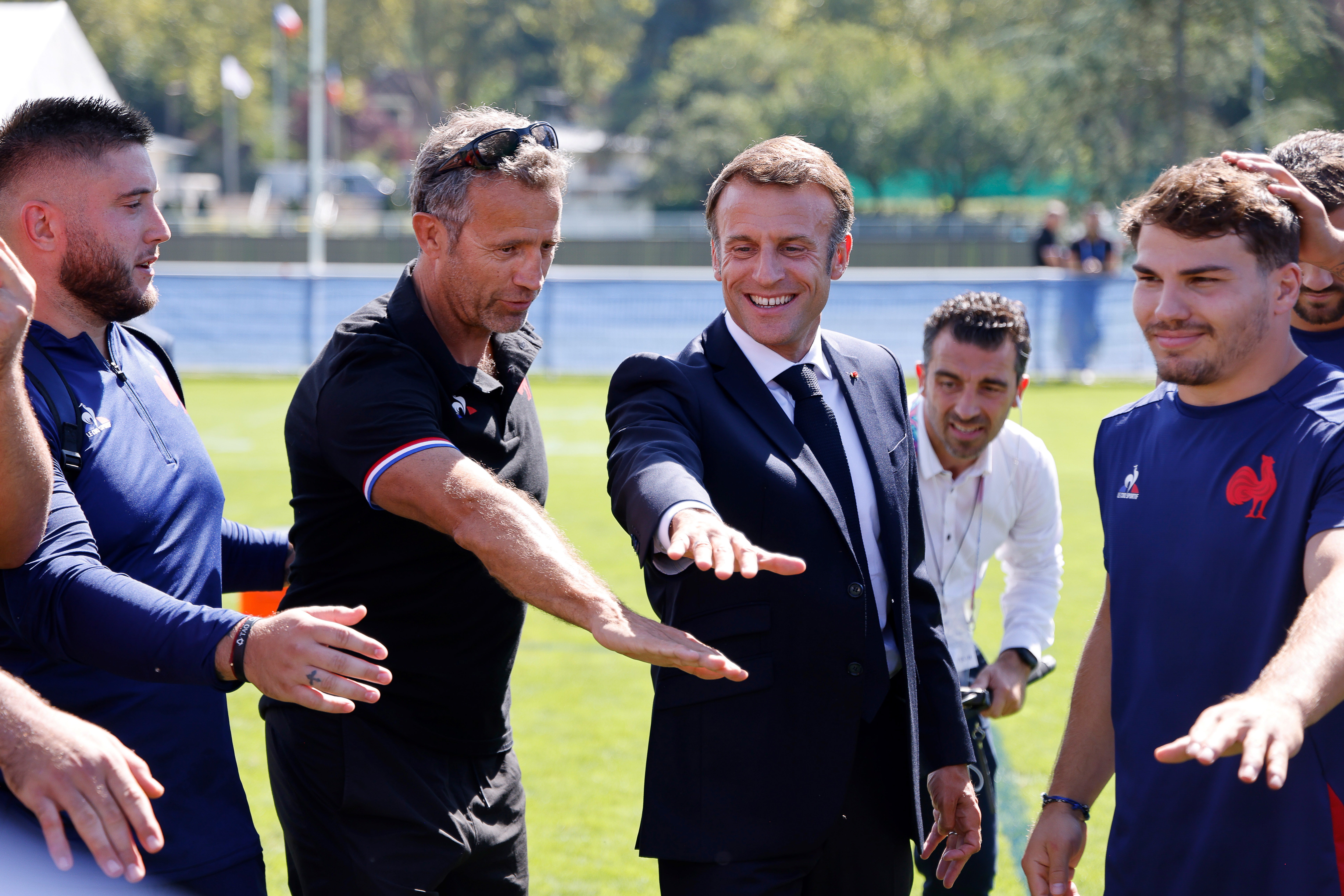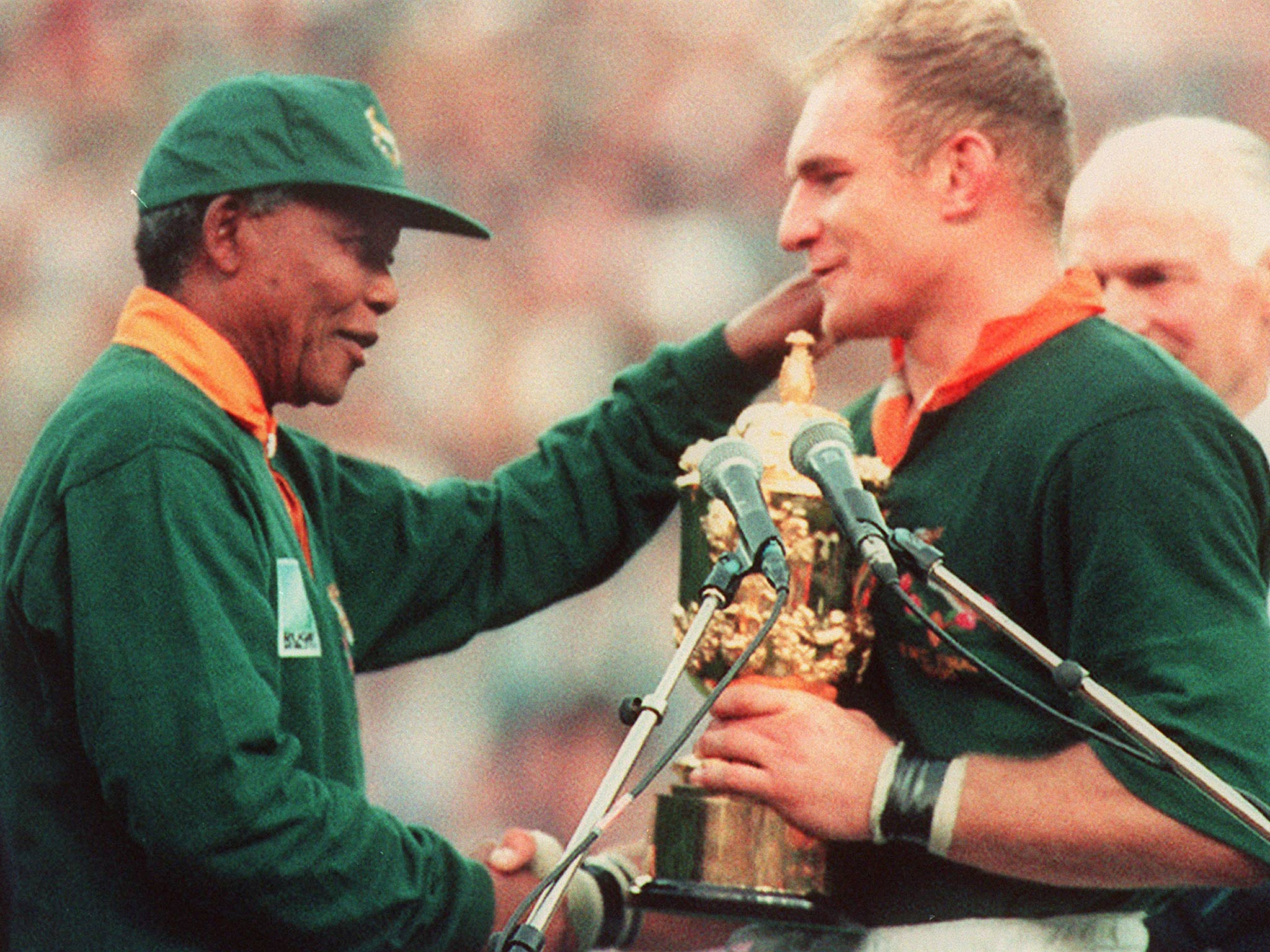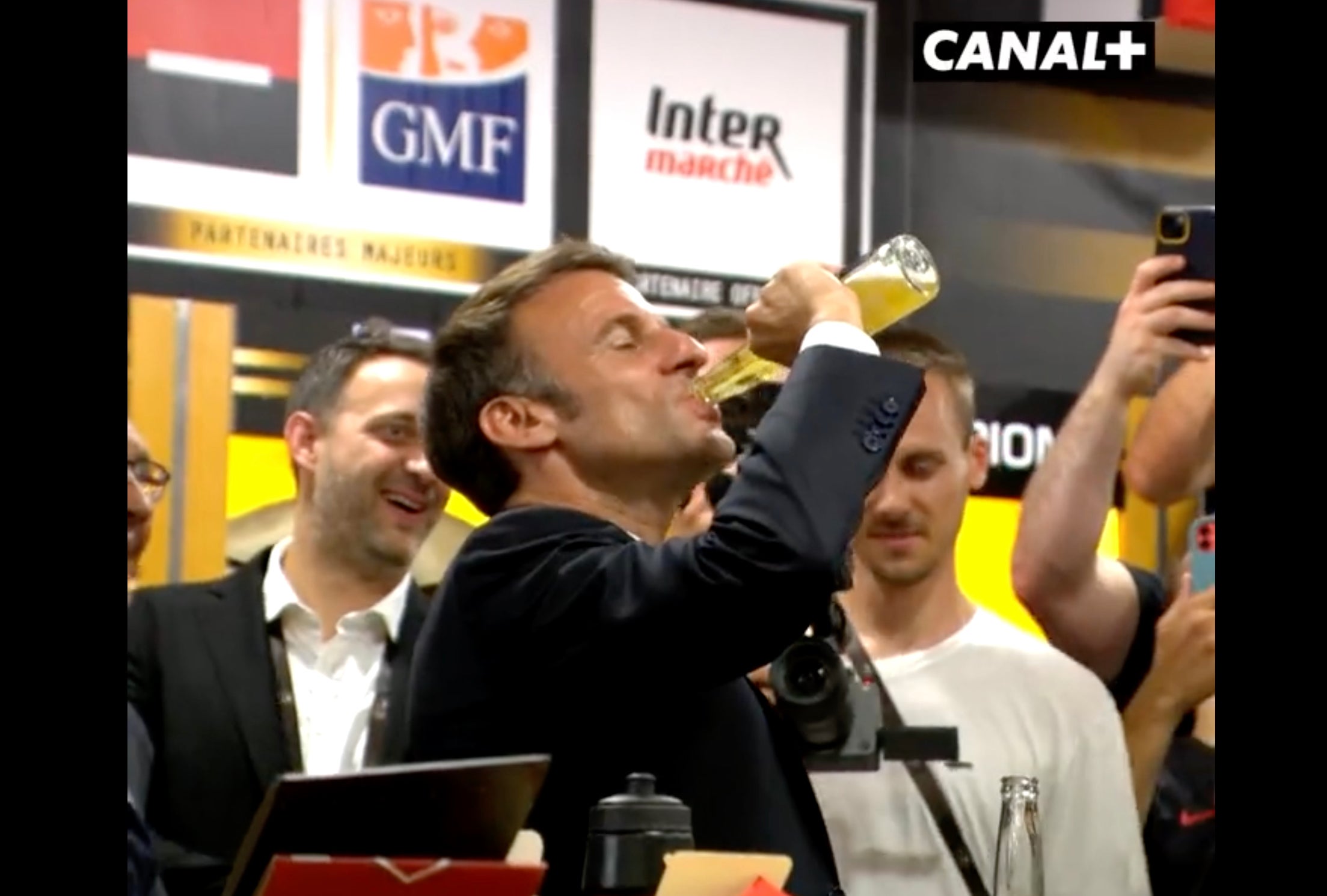Why Macron doesn’t want to drop the (oval-shaped) ball
Not since Mandela pulled on a Springbok shirt has so much national pride rested on a rugby world cup, writes Jim White. Because Macron’s France is riven by division and dismay, and the wily president knows a successful tournament will fade the memories of rioting, yellow-jacket protests and racial tensions in the banlieues


On Friday, the 10th edition of the Rugby World Cup kicks off when the hosts France take on three-time champions New Zealand in Paris. And, even as the haka announces the collision of the third- and fourth-ranked teams in the world, no one can claim that this is a tournament lacking in ambition.
“The Rugby World Cup 2023 will be the biggest yet. Moreover, it can be a catalyst for positive change and play an important role in the advancement of modern society as a whole,” Bill Beaumont, the chairman of World Rugby, announced this week.
Which is some claim for a bunch of blokes chucking an egg around a field. Nevertheless, Beaumont has a point about the scale of the tournament: 600,000 fans are expected to travel to France for matches; 1.8million tickets have been sold; sizeable, modern stadiums from Nice in the south of the country to Lille in the north expect to be rammed for every match.
“We’ve received incredible support from the highest office to the smallest villages,” added Beaumont. “Never has a nation been so ready and so excited to host.”
Again, he is not being entirely hyperbolic. This is a World Cup with a singular political subtext. Because not since Nelson Mandela donned a Springbok shirt to hand over the trophy 28 years ago, has there been such significance placed on it by those in power. For French president Emmanuel Macron all the way down through layers of government to the office of the local town mayor, this competition is about more than just tries, tackles and scrums. This represents the start of a period of time that those in control hope will prove a game-changer. Not least for their own political future.

For those in charge, this World Cup is seen not so much as the opening overture but as a dry run for the grandest of events to come: next summer’s Paris Olympics. Hence their involvement in the organisation. There is pressure from the top to get this dress rehearsal right, for the infrastructure to work, for transport and ticketing to progress smoothly and easily. They do not want a repeat of the 2022 Champions League final fiasco at the Stade de France, where technical issues plagued admission to the stadium and the local police exacerbated things by taking out their frustrations on the heads of Liverpool supporters. Meanwhile, with the cops distracted, local gangs moved in to engage in a systematic campaign of mugging and assault on visitors. This was not the image of the country those in the Elysee Palace wanted to see projected. And they cannot countenance any hint of it again. Their wish is that the world – or at least the part that plays rugby – will see a country fully functioning and operational. Indeed, it would aid their cause immensely were the ever-stroppy French air traffic control unions to call off a strike that threatens airport chaos during the tournament. Because, for the French government right now, the next 11 months of sporting hospitality represents a real opportunity to turn things around. They do not want to drop the ball.
Back in 1998, when France hosted the Fifa World Cup, I was at the semi-final in the Stade de France. Alongside the press box was the VIP section, where the then president Jacques Chirac had taken up a position in the middle of the front row. A block below, a television camera had been installed, ready for post-match interviews. The moment the final whistle went, signalling that France had beaten Croatia and were heading for the final, Chirac set off for the camera. He bundled through the crowds with a vigour that the current French rugby team’s back row would do well to emulate against the Kiwis, pushing and shoving his way to ensure that he was the first face on the evening news bulletin. His determination to gain immediate political association with French sporting success was extraordinary to behold.
Macron has long borrowed from the Chirac playbook. During the football World Cup in Qatar last autumn, he ensured his personal photographer was in place to catch him punching the air when France beat England in the quarter-final. Despite the French team’s brilliance, however, it did not work out for him in the final as it did for Chirac. As he gatecrashed the presentation ceremony, rather than identifying himself with triumph he was obliged to act as a consoling presence to Kylian Mbappe and his defeated teammates. No one looked more disappointed than the president at that turn of events. The chance to make him look good had been lost.
After months of yellow jacket protests, of anti-pension reform marches, of ethnic tension in the banlieues, the current mood among many is of downbeat frustration
Thus a competition on home soil may prove a godsend for Macron. He presides over a country riven with division and dismay. After months of yellow jacket protests, of anti-pension reform marches, of ethnic tension in the banlieues, the current mood among many is of downbeat frustration. Here is the opportunity for another narrative to take hold. As Florian Grill, president of the French Rugby Federation, said earlier this week in words that might well have been scripted by the Elysee Palace: “This French team has the ability to put a smile on the face of the nation, to excite, to show that we can be united. That we can be a nation, to use the words of the president of the republic. It’s the most wonderful mission of all, and you can see that the players and staff are completely committed to it. They understand it is so important for the country.”
It is intriguing that it is rugby that is being promoted as the catalyst for unity. When the team of Zinedine Zidane, Lilian Thuram and Patrick Vieira won the football World Cup in 1998, Chirac and many others saw them as representative of the new France: multiracial, dynamic, modern. Here were young men, brought up in the Paris banlieues, wholly embracing the nation and its values. Not that everyone bought into the joy. The racist right grumbled that many of them were foreign-born interlopers, not French at all.
Rugby, though, has a very different image in the country from football. Its grand ceremonial occasions might take place in Paris, but this is the pastime of the south, the game of Pau and Castres, Toulon and Toulouse. The French team that will step out against New Zealand may be visibly multiethnic but for many of its enthusiasts, they are the representatives of another country entirely from that expressed in the capital. This is old-school France, on which are projected the qualities of community and cohesion so many feel are being irrevocably lost.
Indeed, while Beaumont may have talked about the level of excitement in the nation, that largely depends on where you go. Graham White, an expat retiree who lives with his French wife in Bordeaux, speaks of a town buzzing with expectation.
“We’re hosting Ireland, Wales, Fiji: some great games here and every one of them is completely sold out,” he says. “We’ve got a 10,000-capacity fan park on what I call the promenade – the riverfront in the city centre – and I can see that being packed. Everyone is getting really excited. I think the town is going to be a great place to be.”
Down the coast in Biarritz, however, from where White’s friend Graham Coates is heading to Nice next Friday to watch England against Japan, there is little evidence of gathering fervour.

“I was in my local bar last night asking people if they were excited about the rugby,” he says. “And the only two people who said they were turned out to be Irish. That said, when it comes to international tournaments, I’ve noticed the French have a very different attitude to the English. The English think they’re going to win and load expectation on the shoulders of the team. The French are much more pessimistic and don’t really get excited until their side has at least reached the quarter-finals.”
And in Paris, despite the fact that the opening match and the final will be staged there, there is even less hint of a city in thrall to the game.
“I’m not sure any of my mates have even mentioned it is happening,” says Benny Matthews, who works in the wine trade and lives in the 11th arrondissement – Paris’s Hackney. And that is not, he adds, because his mates aren’t interested in sport. Far from it.
“Paris came alive in the football World Cup,” he adds. “When France won against England the fans were blocking streets, the boulevard from the Republic all the way to the Opera House was gridlocked. I just can’t see how rugby will have that same effect.”
Besides, he adds, what sporting attention there is in the city is already focused further ahead. Behind hoardings and road works, everywhere is evidence of a collective sprucing up for next summer’s extravaganza.
“There is very visible stuff happening around the Olympics, a lot of marketing,” he says. “Things like getting swimming going in the Seine, a lot of the cleaning up of Paris is being linked to the Games.”
A lot of conversations I have with French friends, there’s a real sense of it all going downhill, that the country is going to the dogs
Even with the Olympics, there is an undercurrent of concern that, for the hosts, things will not go as well as might be hoped. When Sebastian Coe, president of the International Association of Athletics Federations, recently attended the Laureus World Sports Awards in the city, he was questioned by the French press about Paris 2024. Was he aware, he was asked, that for many locals the great fear is the Games will not come close to matching the London 2012 iteration that he organised. Coe seemed surprised. He diplomatically replied that he was sure the Parisians would make the most of their beautiful city and deliver the finest Games possible.
Coe may have been taken aback by the tone of questioning, but across much of France, whether in the Parisian suburbs or the villages of Provence, the last couple of years of relentless unrest has created a melancholic national narrative, fostering a sense of gloom about the nation’s cultural and political standing.
“A lot of conversations I have with French friends, there’s a real sense of it all going downhill, that the country is going to the dogs,” says Matthews. “And even if nobody’s chucking fireworks any more, or setting fire to bins or rioting, I think a lot of people, whether they are left or right, blame Macron.”
Which is why the president needs this tournament to be a success. And in one way, he is blessed by his timing. Because the French are hosting at precisely the moment they have a team capable of not only winning – once again, they are the bookies’ favourite – but doing so in cavalier style. Players like Jonathan Danty, Damian Penaud and the magnificent scrum half and captain Antoine Dupont, play with a proper swagger, embodying the endangered French self-image of swash and buckle.
A potential division in the French camp emerged this week with the last-minute call-up of Montpellier player Bastien Chalureau, who is presently appealing a six-month prison sentence for a racially motivated attack outside a nightclub in 2020. Already, former team captain Thierry Dusautoir and some French politicians have called for Chalureau to be deselected, though he has already won six French caps since his conviction.
Should France do it – and South Africa and Ireland, the top two ranked teams in the world, offer the most stringent of challenges – for many it will undoubtedly provide an antidote, however temporary, to the prevailing sense of decline. And were they to win, it is safe to say Macron would seize the opportunity to unleash his inner Chirac and make sure his is the first face on the evening news.
How our own political leader must be watching on with envy. Sadly for Rishi Sunak, the chances of him being there to bask in reflected glory when England lift the trophy are about as high as his chances of winning the next election. Losing three of their four warm-up games ahead of the tournament, the England side currently ensconced in their base in Le Touquet are hamstrung by incompetent leadership, plagued by tactical paralysis, ill-disciplined, uncoordinated, pathologically incapable of exploiting the considerable talent available to them. They are a perfect metaphor for their country after 13 years of Tory rule.
Join our commenting forum
Join thought-provoking conversations, follow other Independent readers and see their replies
Comments
Bookmark popover
Removed from bookmarks